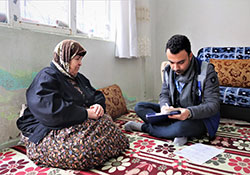Emine, 73 years old, patient in Izmir

WHO
Down a narrow street in the Karabaglar neighbourhood of Izmir, a western city in Turkey, and through the door of a storefront turned residence, a woman named Emine sits on the floor of a tiny room. The room holds only a sofa, a television and an old heater, but it is home to Emine, her son, her daughter-in-law and her two grandchildren. Still, it is better to live in this tiny room, safe in Turkey, than to be in Syria, from which they fled.
For months, Emine was confined to the house, the television her only connection to the outside world. She lost a leg in an industrial accident 20 years earlier in Aleppo, Syria, making it nearly impossible for her to move around.
Then, her son went to the Refugee Health Training Centre in Karabaglar to report Emine’s hypertension. Soon after, a Syrian doctor came to the home to examine her, confirm her illness and prescribe medication. The doctor gave her a sphygmomanometer to measure her blood pressure regularly and said a wheelchair would be coming soon.
When field workers come to check on her, Emine welcomes them with strong Syrian coffee and expresses how grateful and excited she is about the wheelchair that should arrive soon. Her son has promised to take her out for a stroll every day once they have the wheelchair.
“I miss my country very much,” she says. “I am very content in Turkey … but I am afraid to die here.” The tiny room falls silent and both Emine and her daughter-in-law’s eyes fill with tears.
The Refugee Health Training Programme
From the outset, the Refugee Health Training Programme has sought not only to integrate Syrian health professionals into the Turkish health system, but also to ensure that Syrian refugees can access health services – recognizing health as a fundamental human right.
Through the cooperation of the Turkish Ministry of Health, the WHO Country Office in Turkey and partner nongovernmental organizations, the health services provided for Syrian refugees are not limited to the physical locations of the Refugee Health Training Centres; visits to Emine and hundreds of other disabled patients are carried out by field workers.



